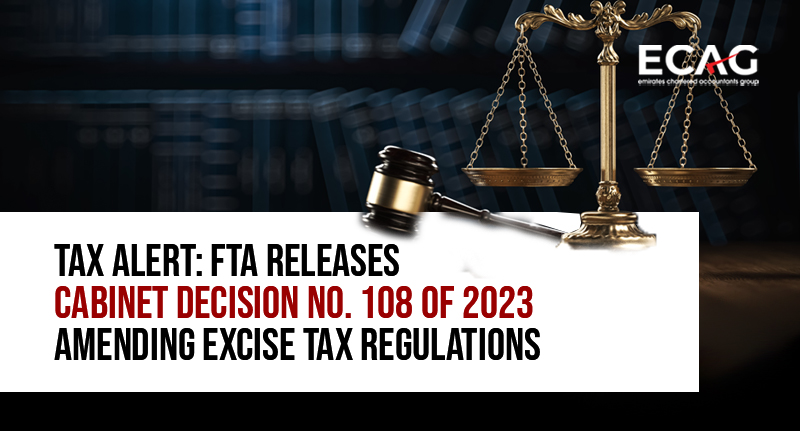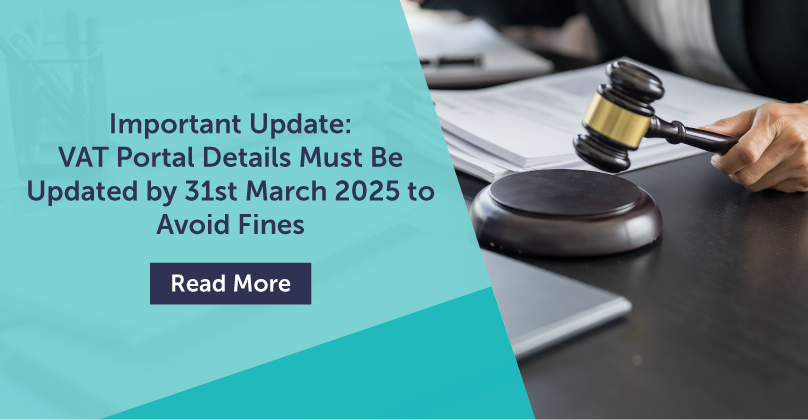
- Dec 07,2023
- All | EXCISE TAX
Amendments to Executive Regulations of Excise Tax Law
The Federal Tax Authority issued Cabinet Decision No. 108 of 2023 on 6th November 2023, amending the Cabinet Decision No. 37 of 2017 on executive regulation of the Federal Decree Law No. 7 of 2017 on Excise Tax. This decision will be effective from 1st December 2023.
The key changes in the amended regulation are as follows:
1. Introduction of new definitions:
The terms ‘Official Evidence’, ‘Commercial Evidence’, and ‘Shipping Certificate’ have been introduced under Article 1, providing more clarification on the type of document.
2. Tax Deregistration:
Article 6 has been amended to empower the Authority to deregister a taxable person without submitting a request under the following conditions:
- If the authority finds the person ceases to conduct activities, unless it is proven that he intends to carry out these activities within the next 6 months, or
- if maintenance of Registration would prejudice the integrity of the Tax system.
3. Stockpiling:
Amendment in Article 11 highlights the consideration of a Taxable person’s entire stock of Excise Goods as ‘excess’ if audited records of stockpiled goods are not maintained.
4. Exemption to release for consumption:
Article 12 has introduced the concept of ‘natural shortage’, wherein if there is a shortage as a result of natural characteristics of the goods and meets standards and controls specified by the Authority, the shortage is notified as per mechanisms approved by the Authority and documents to prove the shortage are kept in place, then the goods are not considered as release of Excise goods for consumption.
5. Treatment of Designated Zone:
The clause of treating a Designated Zone as if it were within the State on change of operation mechanisms or violation of Designated zone conditions has been added to Article 15. The requirement of retaining sufficient documentation on the value and quantity of Excise goods subject to deficiency or shortage that which or will be destroyed has also been added to the Article.
6. Documents for Deductible Tax:
Considering the practical scenarios, the Authority has provided the option of submitting a Customs declaration and commercial evidence or a shipping certificate and Official evidence, to prove the export of goods. However, it is the discretion of the authority to accept the documents being submitted and may specify alternative forms of evidence to the nature of goods or exports.
The Authority has specified that the Authority’s rejection of Tax registration or forced de-registration shall not preclude the compliance of the person with the provisions of the Law, including making another application for registration when the conditions are met.
Another notable amendment in the Decisions coming into effect from 1st June 2024 is the option for a non-registrant to apply for a refund on the excise goods exported directly or indirectly, on fulfillment of certain conditions.
Summary of the Amendments to Executive Regulations of Excise Tax Law
In conclusion, the recent amendments introduced through Cabinet Decision No. 108 of 2023 mark a significant shift in the regulatory landscape governing Excise Tax in the UAE. These changes, effective from 1st December 2023, address key aspects such as definitions, tax deregistration criteria, stockpiling considerations, exemptions for goods release, treatment of Designated Zones, and documents required for deductible tax.
The explicit provisions aim to enhance clarity, streamline processes, and ensure adherence to compliance standards. Taxable persons are urged to familiarize themselves with these updates, recognizing their implications for taxation and operational practices. As the regulatory framework evolves, the Federal Tax Authority continues to strive for a robust and transparent taxation system, promoting fairness and efficiency in the realm of Excise Tax.
How ECAG can help you in this new Excise tax amendment?
CLA Emirates can provide support in reviewing the operations of your entity, ensuring compliance with the updated regulations in Excise Tax.
Purvi Mehta
Manager – Direct Tax
M: +971 52 2800480
E: purvi.mehta@claemirates.com
.




